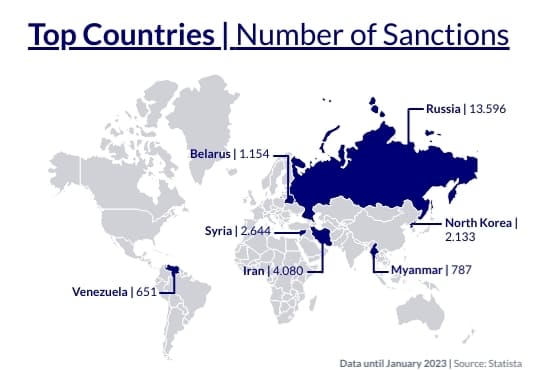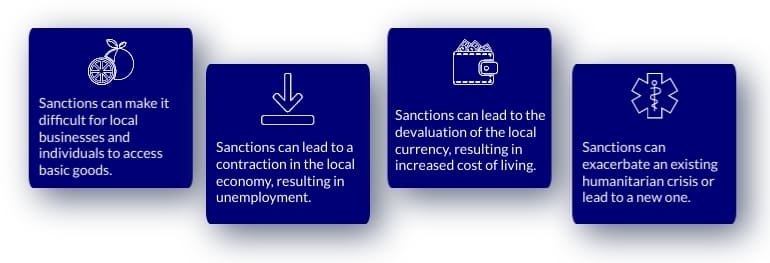
The majority of these sanctions are targeted at countries in the Middle East and North Africa, followed by countries in Europe and the Americas.
Sanction programs are imposed by a variety of actors, including national governments, international organizations, and regional bodies. The United States is one of the most active users of sanctions, with over 100 ongoing sanctions programs targeting a range of countries and individuals. Other major users of sanctions include the European Union, the United Nations, and the United Kingdom.
These statistics suggest that financial sanctions are a widely used tool for achieving political, economic, and security goals. The increasing number of sanctions programs and the range of actors involved highlight the complexity and global nature of these measures.
What is the history of financial sanctions and embargos?
Financial sanctions and embargos have been used as a tool of foreign policy for centuries. In ancient times, embargos were often used to cut off trade with an enemy in order to starve them into submission. In the 5th century BC, the Athenians imposed a trade embargo on the city of Megara in order to punish it for siding with their enemies in the Peloponnesian War.Financial sanctions, on the other hand, have a more recent history. At the end of World War I, the League of Nations proposed the use of economic sanctions as a diplomatic expression to prevent future armed conflicts.

Financial sanctions and embargos have also been adopted by regional organizations such as the European Union and the African Union, as well as individual countries.
What are the various forms of financial sanctions and embargos?
Financial sanctions and embargos can take a number of different forms, depending on the objectives and circumstances of the situation. Some common forms of financial sanctions and embargos include:




The use of financial sanctions and embargos can have significant effects on the target country or individual, restricting their access to resources and limiting their ability to conduct business.
What are the pros and cons of financial sanctions and embargos in foreign policy?
Financial sanctions and embargos can be a powerful tool in foreign policy, as they allow countries or international organizations to exert economic pressure on a target country or individual in order to achieve specific political objectives.
Another potential benefit of financial sanctions and embargos is that they can be relatively low-cost and low-risk compared to other forms of intervention. They do not require the deployment of military forces and can often be imposed without the need for direct confrontation. This can make them an attractive option for countries or organizations that want to exert influence without risking escalation or conflict.
While financial sanctions and embargos can be a useful tool in foreign policy, they also come with significant challenges and drawbacks. As with any policy measure, it is important to carefully consider the potential costs and benefits before deciding to implement them.
One of the most significant challenges is that they can have unintended consequences, such as harming innocent people or businesses. For example, trade restrictions can disrupt global supply chains and lead to higher prices for consumers, while asset freezes can prevent people from accessing their own money or assets.
Another challenge is that financial sanctions and embargos can be difficult to enforce, particularly if the target country or individual is able to find ways to evade them. This can make it difficult to achieve the desired outcome and can even undermine the credibility of the sanctions or embargo.

What are examples of successes and failures of financial sanctions?
Some examples of financial sanctions that have had a positive impact include the sanctions imposed on South Africa during the apartheid era, which helped to pressure the government to end its discriminatory policies, and the sanctions imposed on Iran, which have helped to curb its nuclear program.On the other hand, there have also been examples of financial sanctions that have had negative consequences. For example, the sanctions imposed on Iraq in the 1990s were widely criticized for contributing to the humanitarian crisis in the country, and the sanctions imposed on Cuba have been criticized for harming the country's economy and its people.
Overall, the effectiveness of financial sanctions depends on a variety of factors, including the target of the sanctions, the specific measures implemented, and the level of international support and cooperation.
What improvements could be made to financial sanctions?
It is difficult to predict the future of sanctions or what improvements might be made to financial sanctions. However, there are a few potential developments that could potentially improve the effectiveness of financial sanctions.
Another potential improvement is the use of technology to monitor and enforce sanctions. For example, the use of blockchain technology or other digital tracking systems could make it easier to identify and prevent sanctioned individuals or entities from accessing the global financial system.
Additionally, there may be opportunities for greater international cooperation and coordination on sanctions. Currently, different countries and international organizations often impose their own sanctions regimes, which can be difficult to manage and can lead to conflicting or overlapping measures. Improved coordination and cooperation could help to streamline the sanctions process and make it more effective.







